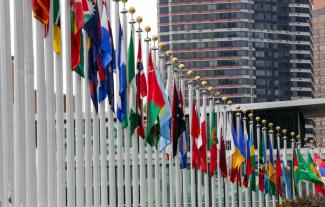Our View
Global challenges require global responses

The judges have thus made it yet a bit harder for President Joe Biden to implement his climate agenda, which is stuck in the Senate (see Katie Cashman on www.dandc.eu). They did not consider how transformative global heating is. They also ignored that Congress established the EPA five decades ago precisely because legislators then – unlike many Republican ones today – accepted that modern society’s long-term viability depends on environmental health. A world power that does not do its part in rising to the most urgent global challenge, however, obviously lacks credibility.
Global solutions for global problems
Humanity is facing global challenges that individual nations cannot effectively rise to on their own. Global heating, ensuring financial stability and managing migration are only three examples. The idea that sovereignty allows a national government to do as it pleases within its borders is outdated.
This principle helped to restore peace after the devastating Thirty Years’ War in Germany four centuries ago, but the big conflict then was between Catholics and Protestants. Sovereignty meant both could exist side-by-side, though not in the same country. The feudal lords decided which camp their land and people would adhere to.
By contrast, the big issues today transcend borders. What happens in one place, affects others, so cooperation is indispensable. That does not make national governments obsolete, just as national governments do not make subnational governments obsolete. A well-run nation state needs well-run municipalities and districts and perhaps other administrative levels too.
The useful principle of subsidiarity
A useful principle of Catholic social teaching is called subsidiarity. Its point is that, whatever a lower-level entity can handle on its own, should be left to that entity, with higher level authorities only being in charge of things that would otherwise be unmanageable. Indeed, the EU has a pattern of pooling sovereignty that way to manage things like foreign trade, the common currency and – to an increasing extent – climate action.
Such cooperation is beneficial. Britain has opted out, and its economy is now performing below the European average. Power is being centralised in London once again, and the country’s social fabric is disintegrating. The next prime minister may manage to rebuild some trust, but restoring Britain’s international standing will take time.
We cannot rise to global problems without pooling sovereignty. All countries must play their part. High-income countries are the most prosperous, dominate most international financial institutes and are over-represented in the UN Security Council. The USA, moreover, is by far the strongest military power. No doubt, the high-income countries must do more to rise to their responsibility. Other countries, however, matter too. Big emerging markets are actually quite strong, but are disorganised as a group. Low-income countries, moreover, too rarely speak with one voice.
A lesson from the 17th century
What is absolutely clear, however, is that the Russian approach to global governance is destructive. Trying to impose one’s ideas on a neighbour by military means leads to disaster – which is exactly why sovereignty was invented in 17th century Germany. As I have argued before, the attack on Ukraine is actually an attack on humanity as a whole (see my contribution on www.dandc.eu), destabilising the international order, driving up food and energy prices and making indispensable global cooperation more difficult.
Hans Dembowski is the editor in chief of D+C Development and Cooperation / E+Z Entwicklung und Zusammenarbeit.
euz.editor@dandc.eu











